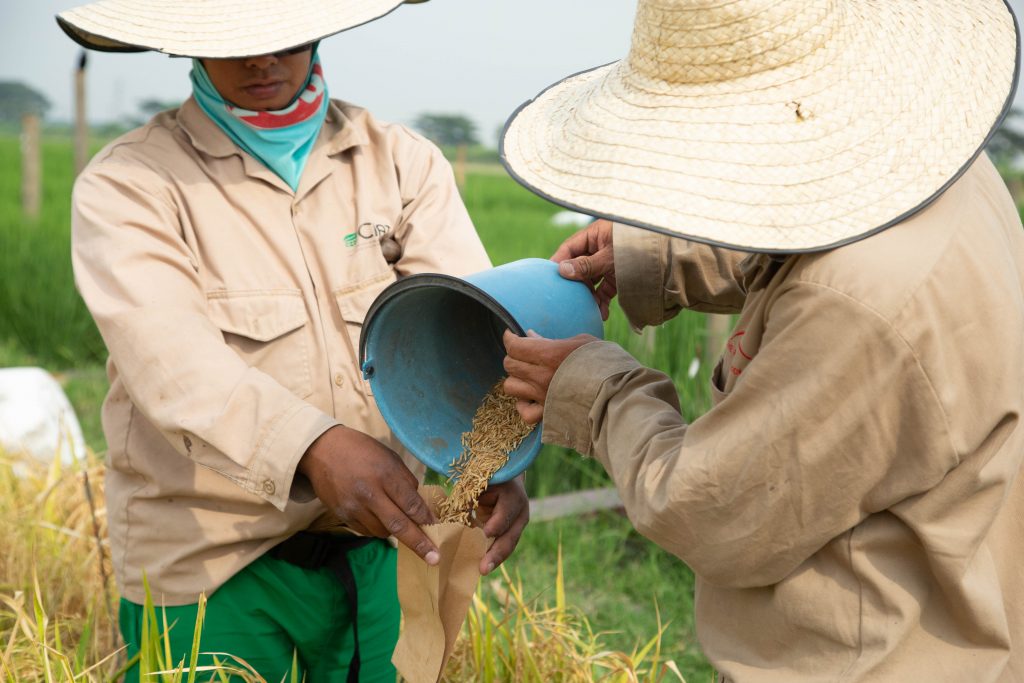Climate Risk Insurance for Colombia’s Smallholder Rice Farmers
The Adapting Agriculture to Climate Today, for Tomorrow (ACToday) Columbia World Project has helped create advanced and sustainable climate services around the world tailored for agricultural decision making.
Countries are using these new services to manage many of the climate-related risks to their food systems. But even the best climate services by themselves cannot manage the entire range of climate risks that farmers confront. Farmers in the United States and other developed countries are able to cover some of the remaining risks through traditional insurance. If their crops are destroyed by a drought or a storm, they can file a damage claim with the insurance company, which would then send out an assessor to verify and quantify the damages.
However, in the six ACToday countries—and most other developing countries—such a system becomes prohibitively expensive for companies, and ultimately makes premiums unaffordable to the rural smallholder farmers who most need insurance.
To address this challenge, IRI has been one of the pioneers to develop a new type of insurance called index insurance. Index insurance payouts are based on an index of weather, such as rainfall measured by satellites or at a local weather station. If the amount of rainfall during critical stages of a crop’s growth cycle doesn’t reach a pre-specified threshold, farmers automatically get compensated without having to file any claims. This innovation has significantly lowered the transaction costs and risks for insurance companies, enabling them to keep premiums low and enabling millions of farmers access to coverage previously unavailable to them.
Index insurance is a key component of ACToday’s work in all six countries, and teams have been working with government and private sector partners to design products tailored to the needs of each country. One of our earliest and most committed partners has been Fedearroz, the rice producers’ federation of Colombia.

“The support of ACToday to our index-based insurance pilot is crucial to our plans to implement climate-smart rice production in Colombia, contributing to increased food security in our country,” said Patricia Guzman, the deputy director of technology at Fedearroz.
With ACToday technical and training support, Fedearroz is launching a pilot insurance project in May of 2020 for 100 farmers in the Meta region, which produces a sixth of all the rice in Colombia.
“Rice is an extremely important crop for Colombia’s food security, and farmers face constant climate risks, from drought to excessive rainfall, that can damage or destroy crops and reduce income,” said ACToday’s Manuel Brahm, part of the project’s Colombia team.
Brahm and others on the team have been training and supporting Fedearroz staff to design index insurance products that will protect their farmers against climate-related crop losses. ACToday and Fedearroz have held multiple workshops with rice farmers there to understand local perspectives and needs.
“They’ve helped us understand which stages of the rice growing cycle they feel are most vulnerable to damage from too much or too little rainfall, which allows us to define a coverage window for the insurance product,” Brahm said. “We also asked them to rank years from best to worst in terms of yields, and we can compare this in real time to what the climate data says using IRI’s Data Library.”
This information feeds into the design of the insurance and helps ensure that companies will be able to provide an affordable product that covers as much risk as possible for the greatest number of farmers.
“Our experience shows that a top-down approach—where scientists or government agencies decide what insurance communities need—doesn’t work in the long term and doesn’t scale up as quickly,” said economist Daniel Osgood, who leads IRI’s Financial Instruments Sector Team. “ACToday is designing index insurance through a participatory process that has involved farmers from the very beginning—they’re the ones who will be deciding whether or not to buy coverage.”
ACToday’s approach has been to train and support the Fedearroz staff to develop the index insurance in-house. This leaves the association with the technical capacity and experience to scale up to more farmers over time. It can also serve as a model for other associations, such as coffee growers, to build on.
This story was adapted from the the 2019 ACToday report.

You must be logged in to post a comment.